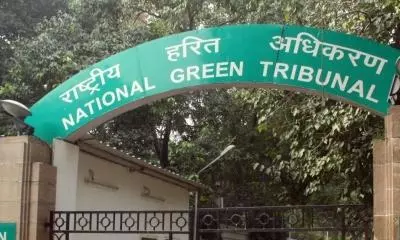
National Green Tribunal imposes Rs 25 cr fine on Hindustan Zinc Ltd for environmental law violations
text_fieldsNew Delhi: The National Green Tribunal has imposed a fine of Rs 25 crore on Hindustan Zinc Ltd, in connection with environmental violations at villages Agucha, Rampura, etc, Tehsil Hurd, District Bhilwada, Rajasthan covering nearly an area about 1,200 hectares of mining land, reports IANS.
As per the complainant, there is heavy blasting and underground mining operations are resulting in contamination of sources of drinking water, resulting in various diseases like Asthma and skin-borne ailments. Livestock is also affected. Dust and stones get accumulated close to the agricultural land and houses of the inhabitants. Toxic and contaminated wastewater is discharged from the mines. The area is 'over-exploited' in terms of the groundwater, it said.
While imposing the fine, the NGT bench headed by its Chairperson Adarsh Kumar Goel, in an order dated February 2, said in case the amount deposited is found to be deficient, the Tribunal may consider further directions, depending upon the material available.
Further, it directed a joint Committee to submit a report of the status of compliance by March 31, 2023.
Merely requiring the cost of the plantation to be deposited without fixing accountability for the past violations may not be adequate, the tribunal noted.
Environmental law violations cannot be taken lightly when the violators are entities like the present company and victims are poor villagers. Annual turnover of the company is said to be about Rs 22,000 crore for over the last three years and revenue receipt for the year 2020-2021 is more than Rs 20,000 crores, though it is stated that there is no separate figure for each particular mining unit, it observed.
The victims of damage are unspecified number of persons spread over more than six Panchayats in the Hurda block namely Bherukhera, Agucha, Parasrampura, Kalyanpura, Kothiya, Balapura and others. Thus, the case is made out for requiring the company to provide compensation for the past violations and bear the cost of remediation, apart from complying with the recommendations of the Committee.






















